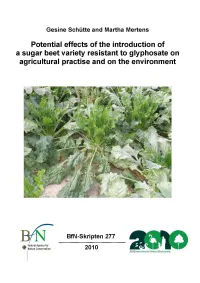BfN Schriften 277 - Potential effects of the introduction of a sugar beet variety resistant to glyphosate on agricultural practise and on the environment
Beschreibung
The introduction of a new herbicide resistant variety can be connected with new agricultural practices. Changes in yields may also occur. Probable changes should be evaluated considering environmental issues such as preservation of biodiversity, soil conservation, pollution and climate change. Effects may be weighted according to their relative importance compared to other impacts and possible measures compromising negative effects.
Changes in herbicide use will unquestionably occur. The combinations of herbicides, amounts and numbers of applications will change. The ecological effects of herbicides on non-target organisms can be direct (toxicity) or indirect (e.g. effects on food chain through exclusion of wild plants and seed set). In addition, herbicide production and application predominantly cause abiotic effects which should be considered by life cycle assessments.
